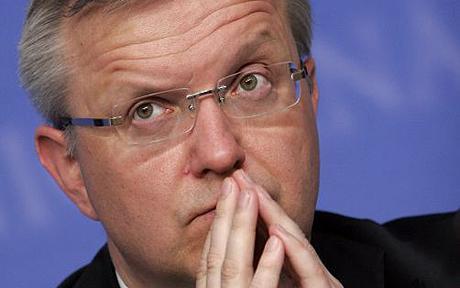Europe should help carry the can for the banks

There is a sense of helplessness. Beyond anger and despair, bewilderment, writes Vincent Browne.
The imminent departure of this wretched government is no longer a consolation - not that its alternative was ever a comfort. It was dismaying for a while that strangers had to rescue us from our own Olympian incompetence. Now, there is no longer dismay - just fear and bafflement.
How can those who took the country to the edge of the abyss bring it back from the brink through negotiations with the EU and IMF?
The delusion that gripped this government two weeks ago now seems to be infecting the IMF and the EU, for there is no rescue from this disaster - certainly not along the lines contemplated.
Just more disaster to come. Brian Cowen, Brian Lenihan and John Gormley stood at lecterns last Wednesday in the press briefing room in Government Buildings to launch a report that was itself delusional.
The growth assumptions seem entirely implausible. Given the deflationary impact of the expenditure cuts and tax increases, real GNP growth of 2 per cent next year, 3.5 per cent in 2012, 4 per cent in 2013 and 4.5 per cent in 2014 is a fantasy.
Yes, it just might happen - like a Lotto win. But, given what else they are doing to the economy, the chances are close to zero. And a little footnote on page 7 of the 140-page report said: ''By the way, we are not taking into account the cost of the rescue package currently being negotiated, even though the outcome of this might well make everything else obsolete."
The markets were saying last Friday that Ireland was heading for default - ie, state bankruptcy. Throughout this entire crisis, the markets have been right, and they are probably right again.
Given our political culture, we simply cannot pay our way out of this mess.
We need a massive subvention (not a loan) from the EU, and the EU can't - or won't - give us that, because it would create a precedent, which it cannot risk giving.
But then, the EU cannot risk not giving us a massive subvention, as an Irish default could threaten the collapse of banks in Germany, France, Britain and elsewhere, the collapse of the euro and misery throughout the continent. The hope was that the European and US economies would drag us out of our morass; that now seems unlikely, as the prospects of strong growth there dwindle.
For months, we were criticised for concentrating too much on the banks: the €20 billion or so they would cost was said to be ''manageable''. But then the cost became €30 billion and, over a period of a few weeks, €50 billion.
Now it is at least €80 billion - maybe more, if the €160 billion that the ECB has provided is anything to go by.
Yes, this is to provide liquidity and would be replaced by normal financial trading if the financial markets thought the banks were secure. But the ''if'' is the rub - and, so far, it seems the financial markets have no faith in our banks, irrespective of what the IMF and EU promise.
The bank guarantee was and is a fiasco.
The government had adequate notice of an impending crisis in banking from at least the beginning of 2008 and did nothing until it burst on them on the night of September 29, 2008.
Even then, they could have opted for a guarantee that applied only to future lending to the banks, or could have let them go into receivership. Instead, to assuage - as they thought - the financial markets, they gave guarantees that the financial markets now believe are beyond the capacity of the Irish state to honour.
(Merrill Lynch made precisely this point in advice to the government that very night.) They also acted in response to pressure from the ECB not to allow any bank to fail.
So what now?
Tell the EU that we cannot afford the cost of the bank bailout - which they urged on us in September 2008 as being in the interests of the European financial system.
Tell them we are going to pull the plug on the banks unless Europe takes on a large part of the bailout burden.
Tell them we are prepared to deal with the fiscal problem, but not with the bank problem any more.
Then deal with the fiscal problem in a fair way.
For a government that has caused the unemployment crisis to further victimise those they drove out of work by cutting social welfare and, effectively, forcing them back into jobs at a lower minimum wage is a double insult. Instead, take on the tax expenditures (ie, the tax breaks).
The total subsidy for private pensions and their like is at least €3 billion a year (see page 309 of the report of the Commission on Taxation). Why should the state be subsidising private pensions for people who are entitled to the state pension anyway?
Tax relief for private medical insurance costs €321 million.
People earning over €150,000 a year (average income over €300,000 a year) pay just 27 per cent in income tax.
Why not 37 per cent, which would yield €1 billion more? And, yes, we need cuts in public expenditure and in public service pay: everyone earning more than €150,000 should be brought back to that amount.
We can get out of this if our negotiators are bold, if we are fair and if we resolve to create a better society and make it happen.
